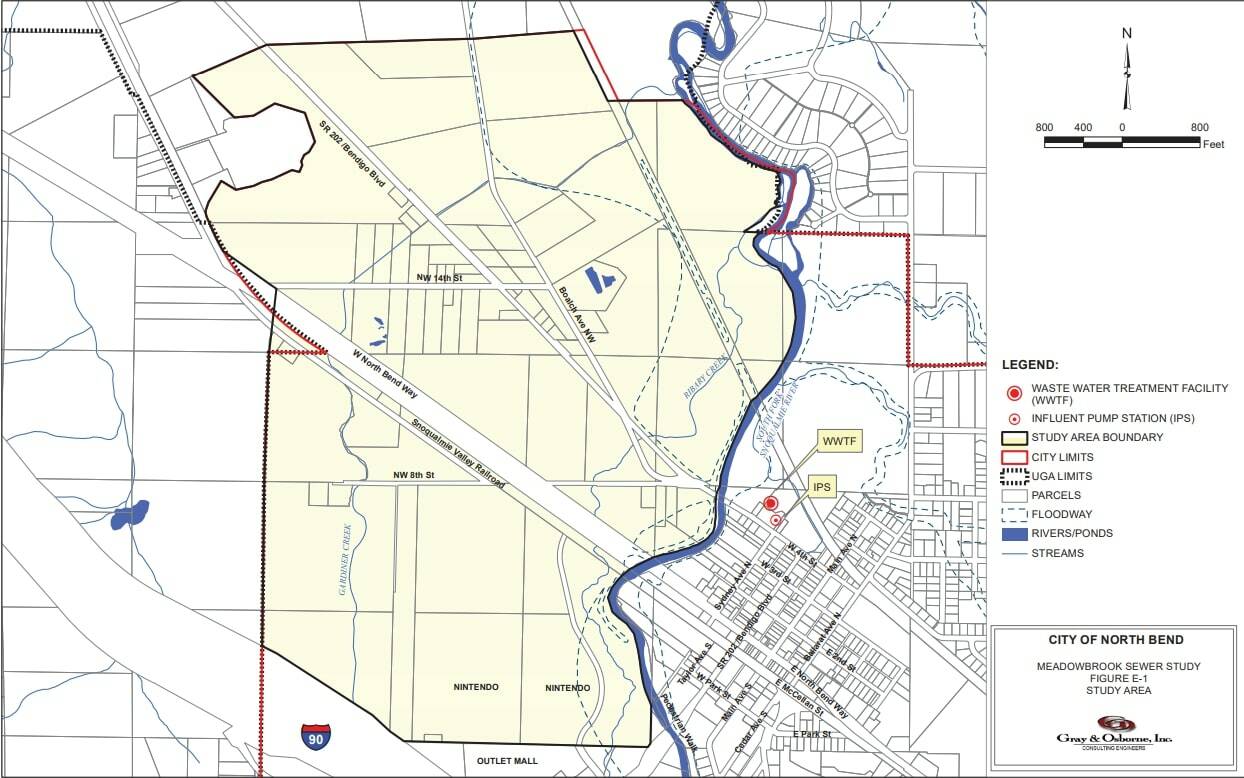The long saga to bring a sewer system to North Bend’s Meadowbrook neighborhood met a slight roadblock Nov. 16, as the city council voted 5-2 not to join the Utility Local Improvement District (ULID) until after more questions are answered.
The proposed motion was not to form the ULID, but rather a vote if the city, which owns roughly one-third of the land in the neighborhood, would vote yes in joining the petition.
“This is not voting on whether the ULID is being created or not,” said North Bend Mayor Rob McFarland. “It’s simply voting if the city will join the ULID.”
In order to bring the sewer system to the neighborhood, a majority of property owners must sign a petition agreeing to the change.
A recent petition effort, excluding city owned properties, found that 52.78% of property owners by land area wanted the ULID, while 47.22% either opposed it or did not respond to the petition.
For years, some private property owners have been attempting to extend the public sewer system into the neighborhood. Properties in the Meadowbrook neighborhood currently have septic tanks.
Wende Miller, who started the petition, is the owner of Bendigo Properties LLC, which owns land in the neighborhood. She said she has been trying to develop her property for 17 years.
“This area has a potential to be an economic powerhouse for the city, and it’s been largely untapped due to the city’s code restrictions,” Miller said. “If you have no sewer, you can’t develop, you have no economic use for your property.”
However, the success of the petition is largely dependent on the council’s vote. The city owns 10 parcels of land in the neighborhood, roughly 20%, enough to sway the vote.
If the council votes yes and the city signs the petition, 73% of property owners would then be in support. If the city does not sign the petition, then only 35% are in support.
Several council members said although they supported the ULID, they had concerns about the city joining the petition without looking at cost impacts for residential property owners.
Councilmembers Jonathan Rosen and Brenden Elwood said they went door-to-door after realizing a majority of property owners who did not vote on the petition were in the residential portion of the neighborhood. Both expressed concerns that some residents were unaware and won’t be able to afford the cost of the ULID.
“There’s a lot of folks out there who feel they’re going to be forced out of their home,” Rosen said. “They’re not interested in developing their property. This is their forever home, this is their retirement home. I don’t want to see us put a burden on these folks.”
Several councilmembers said they felt communication about the process could have been better. They also had questions about whether the project could be split between residential and commercial property owners.
“I do believe this is good for commercial [property owners], but I don’t want to see residents and senior residents be impacted,” Councilmember Alan Gothelf said. “We have to come up with something on the residential side.”
Benefits of a sewer system in Meadowbrook
The implementation of a sewer system could have several economic and environmental benefits for the city and property owners. Adding the sewer system is anticipated to grow the combined property value of the neighborhood by $11,617,000, a 64% increase.
At an August ULID town hall, city Public Works Director Mark Rigos said the benefits of a sewer system include that public sewer is managed by the city, requiring less involvement from residents, and public sewer would also be less likely to overflow and pollute groundwater than a septic system.
Several of the septic systems on Meadowbrook properties are old and in violation of current King County health department standards, but because they were installed decades ago, they have been grandfathered in. However, there is no known pollution.
The ULID project is expected to cost just below $7.5 million, according to an appraisal by a private firm. This would require property owners, including the city, to pay back the cost over a 20-year period at a 2% to 2.5% interest rate starting around 2025.
The amount owed by each property owner would be proportional. A large chunk of the payment, about 30%, would be dealt to Nintendo America, which owns two properties in the area.
“As some of [the council] noted at last week’s work study meeting, it does seem unfair to ask Nintendo to pay the lion’s share of costs for sewer improvements that Nintendo does not want or need,” said Megan Lin, a Nintendo spokesperson.
Voting to join the petition would not itself form the ULID, but would move the process along. The formation of the ULID would require a separate vote of the council.
The council, excluding Ross Loudenback and Heather Koellen, ultimately voted to take the proposal to another work study meeting in order to learn more about ways the ULID could be financed to reduce the impact on residential families.
“There’s a willingness to get this done, but there’s some information we need,” Rosen said. “Let’s find a solution to this project for these residents. That’s my primary concern.”


